The revolutionary spirit of comrade Le Hong Son lives forever.
(Baonghean.vn)- The indomitable fighting spirit and heroic sacrifice of comrade Le Hong Son live forever in the hearts of generations of Vietnamese people. The revolutionary legacies he left behind will be promoted forever by present and future generations.
On June 29, Nam Dan district held a ceremony to celebrate the 115th birthday of revolutionary senior Le Hong Son.
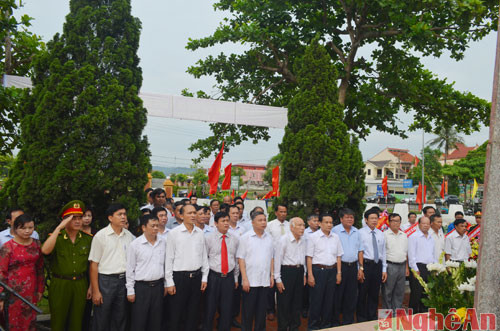 |
| Delegates and people of Nam Dan district commemorate comrade Le Hong Son. |
Attending the ceremony were comrades: Le Ba Hung, Provincial Party Committee member, Head of the Provincial Party Committee's Propaganda Department, leaders of provincial departments, agencies, leaders and people of Nam Dan district, and relatives, family and clan of comrade Le Hong Son.
At the ceremony, on behalf of the Party Committee, government and people of Nam Dan district, comrade Thai Thanh Quy, Provincial Party Committee member, Secretary of Nam Dan district Party Committee, reviewed the revolutionary life and heroic and noble sacrifice of comrade Le Hong Son.
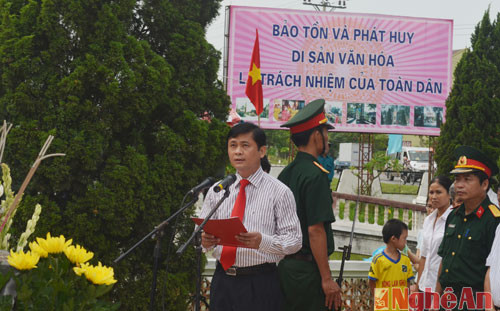 |
| Comrade Thai Thanh Quy presented a speech at the commemoration ceremony. |
Le Hong Son's real name is Le Van Phon (commonly known as Le Van Phan), born on June 29, 1899 in a poor Confucian family with a patriotic tradition in Xuan Ho village, Xuan Lieu commune (now Xuan Hoa commune). Born in a tragic moment in the nation's history: the French colonialists opened fire to occupy Bac Ky, Hue Citadel fell, the anti-French movement under the banner of "Can Vuong to restore the country" by Phan Dinh Phung had just been extinguished in blood and tears. His hometown Nam Dan had become a gathering place for patriotic scholars and scholars, seething with the Dong Du movement.
The atmosphere of the patriotic wave in the early years of the 20th century influenced Le Van Phan's mind, urging him to quickly determine the right direction for himself. In 1920, following the call of the Dong Du Movement and the Duy Tan Association founded by Phan Boi Chau, Le Van Phan left his family, friends, and homeland to go to Thailand to begin his career of saving the country. At Trai Cay - Thailand (a patriotic base of the Vietnamese people founded by Phan Boi Chau and Dang Thuc Hua), Le Van Phan changed his name to Le Hong Son.
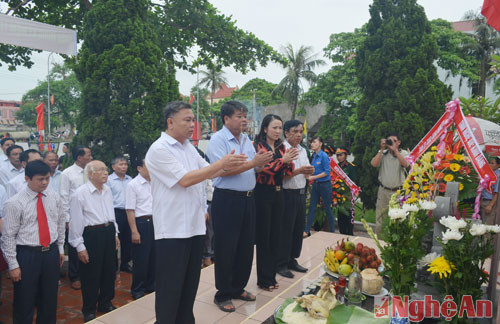 |
| Delegates offered incense in memory of comrade Le Hong Son. |
In 1921, Le Hong Son and Phan Boi Chau went to Guangzhou (China) to work. In 1922, assigned by the organization, Le Hong Son used a pistol to eliminate the traitor Phan Ba Ngoc. In 1923, together with Ho Tung Mau and a number of other comrades such as Le Hong Phong, Pham Hong Thai, Luu Quoc Long, Truong Van Linh ... established "Tam Tam Xa" (a revolutionary organization of patriotic Vietnamese youth in the 1920s). On June 19, 1924, assigned by Tam Tam Xa, Le Hong Son helped Pham Hong Thai throw a bomb to assassinate Merlan - the Governor General of Indochina, when he came to attend a party at the Victoria Hotel in Sa Dien (in Guangzhou, China).
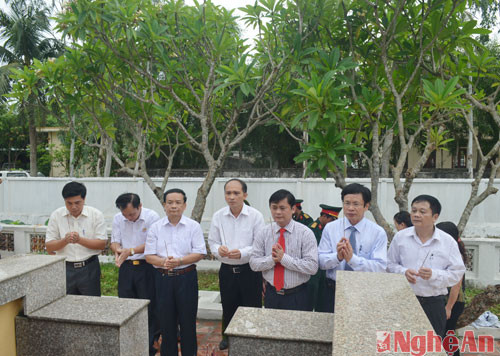 |
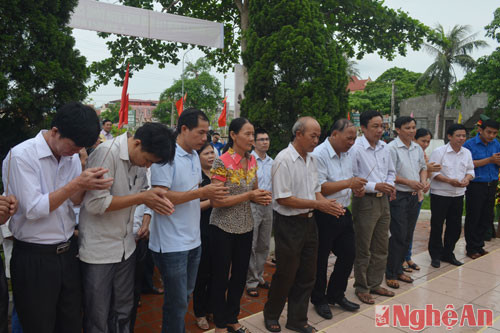 |
| Leaders and people of Nam Dan district offer incense to commemorate Comrade Le Hong Son. |
In 1924, Nguyen Ai Quoc returned to Guangzhou from the Soviet Union and made contact with the Tam Tam Xa group. In early 1925, under the leadership of leader Nguyen Ai Quoc, the Vietnam Revolutionary Youth Association was established, Le Hong Son was one of the first to join the association and was appointed to the General Department. In March 1925, Le Hong Son was introduced by Nguyen Ai Quoc to attend the first course at the Whampoa Military Academy. He was also a member of the Communist Group - the nucleus of the Communist Party organization later. Le Hong Son and Nguyen Ai Quoc published the newspaper "Thanh Nien", organized cadre training classes and was a member of the "seal holder" (keeper of the seal) of the "Union of Oppressed Peoples in East Asia" - an organization founded by Nguyen Ai Quoc.
In 1927, when the counter-revolutionary forces staged a coup in Guangzhou, members of the Vietnam Revolutionary Youth League were implicated. Le Hong Son and a number of his comrades were arrested by Chiang Kai-shek's government. At the end of 1927, in the face of public opposition, Chiang Kai-shek's government was forced to release Le Hong Son and his comrades. After that, Le Hong Son went to Hong Kong. Here, Nguyen Ai Quoc assigned him the task of consolidating the Youth General Department and opening training classes for cadres.
In 1929, the domestic workers' movement developed, three communist organizations in Vietnam were born one after another, Le Hong Son belonged to the Annam Communist Party. He was one of the people who actively campaigned to unify communist organizations into a single communist party. After the Party was founded, Le Hong Son was assigned to stay and work in the Vietnam branch of the Association of East Asian Oppressed Peoples. At the end of 1931, Le Hong Son was imprisoned for the second time by Chiang Kai-shek's government. Thanks to the intervention of Mr. Ho Ngoc Lam, Le Hong Son was released from prison but was not allowed to stay in China. Leaving China, Le Hong Son went to Burma, Thailand, and finally secretly returned to Shanghai to continue his mission.
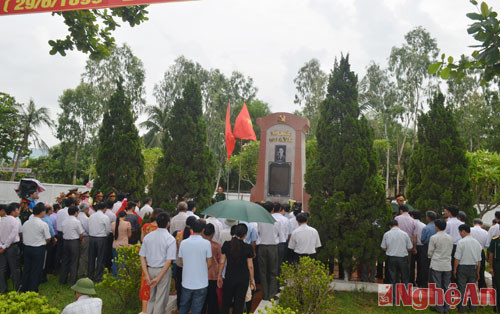 |
| Panorama of the incense offering ceremony. |
After the leaflet distribution incident to celebrate International Labor Day on May 1, 1932, Le Hong Son was once again arrested by the Shanghai authorities. On September 25, 1932, he was transferred to the French authorities in Indochina for custody and processing, and sent to Vinh prison. Knowing that Le Hong Son was the one who eliminated the traitor Phan Ba Ngoc, who was in the same group as Pham Hong Thai (who had plotted to assassinate the Governor General of Indochina, Merlan), he was sentenced to death by the Southern Court in Nghe An. On February 20, 1933, the feudal colonialists brought comrade Le Hong Son to be executed at Cho Tro, Xuan Ho village, Xuan Lieu commune (now Xuan Hoa commune).
The indomitable fighting spirit and heroic sacrifice of comrade Le Hong Son live forever in the hearts of generations of Vietnamese people, especially in the hearts of the people of Nam Dan.
At the ceremony, in front of the mausoleum of revolutionary predecessor Le Hong Son, provincial leaders, leaders and people of Nam Dan district and relatives of comrade Le Hong Son offered incense and flowers, expressing their respect and gratitude for the heroic sacrifice of the revolutionary predecessor, an excellent colleague of leader Nguyen Ai Quoc.
Nguyen Khoa
